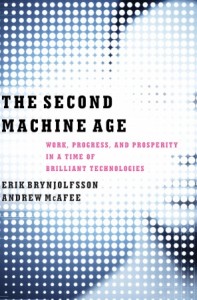[contextly_auto_sidebar id=”rH31sHcPNX2fJ8BUGdeIZ6rMJes54987″]
THE honest answer to that question is, Well, maybe. Today I have a Daily Beast interview with Andrew McAfee, an MIT researcher and co-author of the new book The Second Machine Age. Hi s previous book, Race Against the Machine, took a cautionary look at how digital technology, including artificial intelligence, was leading to levels of unemployment that went beyond the recession; I spoke to him for an article about the plight of record-store (and video and bookstore) clerks as the Internet destroyed their employers.
s previous book, Race Against the Machine, took a cautionary look at how digital technology, including artificial intelligence, was leading to levels of unemployment that went beyond the recession; I spoke to him for an article about the plight of record-store (and video and bookstore) clerks as the Internet destroyed their employers.
My interest in all of this, of course, is motivated by my concern for what technology is doing to the creative class. The digital revolution has been, like any revolution, a mix of good and bad. But as a journalist who writes about music and the world of culture, I see a lot of damage.
McAfee has lately become more sanguine about technological change, but his point of view is too nuanced and informed to be digital-utopian or heartlessly neoliberal. Here’s the way I begin our conversation:
Q; The question that runs through your book is seems to be, What do human being do that machines can’t? As recently as a decade ago, the smartest people pursuing that question thought it came down to pattern recognition and “complex communication.” How has it changed since? Are we realizing that it’s not that simple?
A: That’s absolutely the case. Winning at Jeopardy, driving a car in traffic, understanding what I am saying now and what to give back to me – these are all exercises in pattern recognition and complex communication. And technology has demonstrated that it can do all of these things pretty well right now, and getting better quickly over time. So our old frameworks of what people were sustainably better at, they don’t hold up anymore.
McAfee is an expansive thinker and — at least when paired with co-author Erik Brynjolfsson — a lucid writer. As may be clear to those who know my work, I don’t entirely agree with his guarded optimism about the stakes of the second machine age. But the book is clear and substantial, and I urge everyone who cares about these subjects to take McAfee’s and Brynjolfsson’s work seriously.
